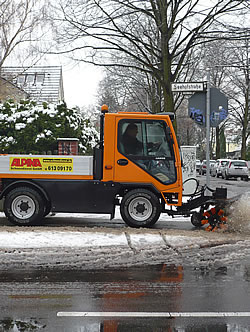On November 11, 2010, the Berlin House of Representatives has passed a revised street cleaning law (Straßenreinigungsgesetz = StrReinG).
Important Information about this Revised Law:
The revised law stipulates that sidewalks with a width required for pedestrian traffic (at least 1 meter) must be cleaned immediately after snowfall has stopped. (Note: From the winter season 2011/2012 on, the minimum corridor width for snow removal and de-icing is 1.5 meters if the sidewalks are located in streets of the cleaning categories 1 and 2). If snow keeps falling for a longer period of time, snow must be removed in adequate intervals. In case of black ice or hard-packed snow abrasives must immediately be applied to the sidewalks. Ice must only be removed if the danger associated with it cannot be minimized by sanding the sidewalks.
The use of any defrosting agents (e.g. salt, carbamide) is still prohibited without exceptions.
Snow and ice must be removed from hydrants, accesses to phone booths, emergency phones, elevators, mail boxes and parking meters.
The task of cleaning public transport stops was transferred to the city's cleaning company Berliner Stadtreinigung (BSR).
The previously applicable street cleaning law's takeover provision, i.e. commissioning of a winter maintenance service incl. reporting to the local public order office (submission of a takeover declaration) according to which responsibility is transferred by law has been cancelled. Local residents who are obligated to ensure snow-free and de-iced sidewalks may commission third parties (note: also road maintenance service companies) to provide such services by concluding according private-law contracts. The responsibility however for ensuring proper execution of road maintenance services remains even if third parties are commissioned. Pursuant to the jurisprudence of the German Supreme Court (Bundesgerichtshof) on the transfer of road-safety obligations - including road maintenance services - these maintenance duties can be "delegated with the effect of own discharge" so that the local resident's road-safety obligations are limited to controlling and monitoring their fulfilment.
We hope that the above short description is helpful and answers all your questions.




 Tel. +49 (0) 30 6130 9170
Tel. +49 (0) 30 6130 9170